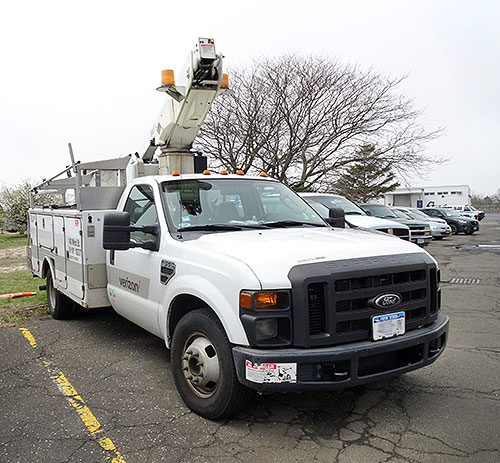IBEW members employed by Verizon joined with their counterparts from the Communications Workers of America to overwhelmingly approve a 3-year extension of their collective bargaining agreement with the telecommunications giant, ensuring labor peace for the next four years.
 |
|
A Verizon truck sits in a parking lot in New York. IBEW members employed by Verizon along with their counterparts from the Communications Workers of America voted overwhelmingly to extend their collective bargaining agreement earlier with the company this year. Flickr/Creative Commons photo by rwcar4.
|
A tentative agreement was announced on July 7 and approved by IBEW and CWA members afterwards. The current agreement, which was scheduled to end on Aug. 5 of next year, is now extended until Aug. 1, 2026.
Boston Local 2222 Business Manager Myles Calvey, a member of the International Executive Council who has taken part in multiple contract negotiations with Verizon, hailed the agreement, especially provisions that called for additional wage increases and allow call center employees work-from-home flexibility.
He also saluted CWA representatives for presenting a unified front with the IBEW throughout the negotiations. The two unions have long represented Verizon employees throughout the upper Northeast and New England. The IBEW currently has about 8,000 members employed by the company.
Calvey was joined on the negotiating committee by Syracuse, N.Y., Local 2213 Business Manager Barbara Carson and East Windsor, N.J., Local 827 Business Manager Robert Speer.
“The company worked with us and it’s a concession-free contract,” Calvey said.
Added Carson: “We didn’t lose anything and got unprecedented raises.”
Verizon employees covered by the deal will receive a 1.25 % raise this year in addition to the wage increases they were already scheduled to receive under the extended contract. They also received a $750 ratification bonus and will receive an additional 1% increase next year in addition to their scheduled wage increase. Verizon agreed to return to a cost of living adjustment in 2025.
Call center employees will continue to work remotely, a practice started during the COVID-19 pandemic. That is a huge win for Carson’s local, which mostly consists of Verizon call center employees.
Another win came with the on-line chat feature, which more customers are using instead of speaking to a representative over the phone. For the first time, Verizon agreed to allow IBEW and CWA members to work in that area, which Carson hopes leads to additional jobs.
That’s especially important following a wave of retirements this year when the General Agreement on Tariffs and Trade Rate – commonly called the GATT rate – climbed to its highest in some time, she said. The rate determines payments to Verizon’s defined-benefit pension programs, and that increase in funding prompted more employees than usual to retire.
“We’ve been losing members at a terrible rate,” Carson said. “Now, we’re guaranteed to get some new hires. Hopefully, the work we’re getting will justify even more in the future.”
Speer noted the $1.2 trillion infrastructure bill passed by Congress and signed into law by President Biden last year ensures plenty of work is coming to all unionized telecommunications workers, including those at Verizon.
Combined with the increase in pay and improvements in the pension and health insurance costs, that made it the right time to extend the deal, Speer said. By the end of the contract, members who are fully taking advantage of their health care benefits will only be paying about $300 per month on a family plan, he said.
“It’s a win for us and a win for Verizon,” said Speer, whose local represents technicians employed by telecommunications companies throughout New Jersey.
“If your employer is doing well, your membership should be doing well,” he said. “I think both sides are going to be doing good with the infrastructure bill and the work we’re going to get from that. This will give us more members making good salaries.”
After a contentious relationship for several years, which was punctuated by a 49-day strike in 2016, the IBEW and CWA have developed a more fruitful partnership with Verizon since. Much like this year, the collective bargaining agreement was extended in 2018 following productive discussions with no hint of any job action.
Many observers credit that to Verizon CEO Hans Vestberg, who took over after the 2016 strike and has shown more willingness to work with unions, as well a commitment to continue the uninterrupted buildout of the 5G Network.
“It’s a win-win for us and also for Verizon,” Speer said.
Verizon also is taking part in the Affordable Connectivity Program, which gives low-income Americans a $30 per month discount on their internet services. It was part of the infrastructure bill.
“Congratulations to our negotiating committee and all our members employed by Verizon,” International President Lonnie R. Stephenson said. “This agreement provides substantial improvements in pay and benefits and is another reason why we worked so hard to help the Infrastructure Act become law.
“Verizon and our other telecommunications partners are expanding services to all Americans and doing it with good-paying, union jobs.”